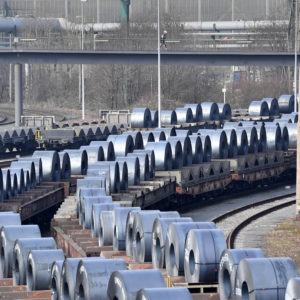The President’s proposal to levy a 25 percent tax on steel imports and a ten percent tax on aluminum is exceptionally ill advised because restricting free trade is likely to damage the economy and undermine the nation’s long term security despite claims to the opposite. The proposed tariffs are themselves a threat to the country’s national and economic security. One might ask the following question: How does increasing the cost of every defense item that uses those products, be it military vehicles, missiles, or rifles, improve U.S. capabilities and protect the country from overseas threats? The administration claims that the tariffs are needed for national security reasons because domestic production of steel and aluminum is vital for the national defense effort, but deposits of iron ore and bauxite in the United States are not going anywhere anytime soon, and Canada, one important source of steel and aluminum for the United States, also isn’t planning on moving its iron ore and bauxite mining industries to China.
This is not the first time that a somewhat outlandish national defense argument for domestic protection has been made. In the 1960s, for example, calls for protectionist interventions in the U.S. wool market were justified on the grounds that U.S. troops needed warm coats and the country couldn’t reliably access wool from Australia, New Zealand or the United Kingdom. All this at a time when U.S. troops were fighting in Vietnamese jungles and not in the North Pole or the Alps.
Of equal concern to the U.S. economy, are the effects of the tariffs on the nation’s domestic industries that rely on aluminum and steel imports. The U.S. automobile industry, for one, is apprehensive about the impact on the production costs of cars, trucks, buses and other vehicles, particularly when compared to overseas car companies. The construction industry is also worried about higher costs as the proposed tariffs will increase the prices of needed essential materials, especially for the construction of commercial buildings. Energy companies are concerned about the several hundreds of millions of dollars increases in the cost of Keystone and other pipelines. Even Pepsi, Coke and Coors are facing higher costs as the price of aluminum cans will increase, which in turn will cause a ripple effect on the prices of canned soda, beer, and soups.
Agricultural commodity groups are also legitimately worried that access to important export markets for their farmers will be restricted or terminated because of “countervailing measures” by other countries: i.e., the imposition of high tariffs on some U.S. exports. Such actions are permitted under the World Trade Organization agreements when a country like the United States is deemed to have violated its commitments to open markets for products like steel and aluminum. American soybean growers and wheat farmers, for example, are worried that important potential markets for U.S. grain and oil seed exports, such as China — and other countries like Japan from which America imports steel and aluminum products — will impose retaliatory high tariffs on U.S. agricultural commodities.
In addition, ironically, despite some of the claims being made by supporters of high tariffs, any gains in employment in the U.S. mining, steel and aluminum industries will very likely be more than offset by job losses in other sectors of the U.S. economy. Higher tariffs on steel and aluminum could well to end up destroying instead of creating jobs for U.S. workers, when all of their economy-wide employment effects are taken into account.
Thanks to economist David Ricardo who gave us the concept of comparative advantage in the early 1800s, for over 200 years competent economists have clearly understood that anti-trade policies will likely hurt the economic well-being of most people. Every time policymakers and their advisers forget or ignore that fact, economic chaos tends to ensue. The president’s proposed tariffs on steel and aluminum are a clear and present example of the very real dangers that economic protectionism creates: Higher prices for every family, more costly military defense programs, fewer jobs for working people, and even a minor shove toward cost-push inflation. It’s a plan, but not a very good one.

